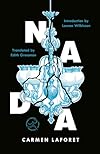Carmen Laforet (1921–2004)
Author of Nada
About the Author
Series
Works by Carmen Laforet
Diez cuentos 2 copies
LAF La insolación 1 copy
Al colegio 1970 1 copy
LOS EMPLAZADOS 1 copy
La muerta 1 copy
Mis paginas mejores 1 copy
Associated Works
Spanische Erzähler der Gegenwart — Contributor — 1 copy
Tagged
Common Knowledge
- Legal name
- Laforet Díaz, Carmen
- Other names
- Laforet i Díaz, Carme
Laforet Diaz, Carmen - Birthdate
- 1921-09-06
- Date of death
- 2004-02-28
- Burial location
- Cementerio de la Almudena, Madrid, Spain
- Gender
- female
- Nationality
- Spain
- Birthplace
- Barcelona, Spain
- Place of death
- Madrid, Spain
- Places of residence
- Barcelona, Spain
Canary Islands, Spain
Madrid, Spain - Education
- University of Barcelona
Universidad Complutense - Occupations
- short-story writer
novelist - Relationships
- Sender, Ramon J. (correspondent)
- Awards and honors
- Premi Nadal (1944)
Members
Reviews
Lists
Schwob Nederland (1)
Hidden Classics (1)
Awards
You May Also Like
Associated Authors
Statistics
- Works
- 27
- Also by
- 3
- Members
- 1,717
- Popularity
- #14,960
- Rating
- 3.7
- Reviews
- 64
- ISBNs
- 129
- Languages
- 14
- Favorited
- 2


















